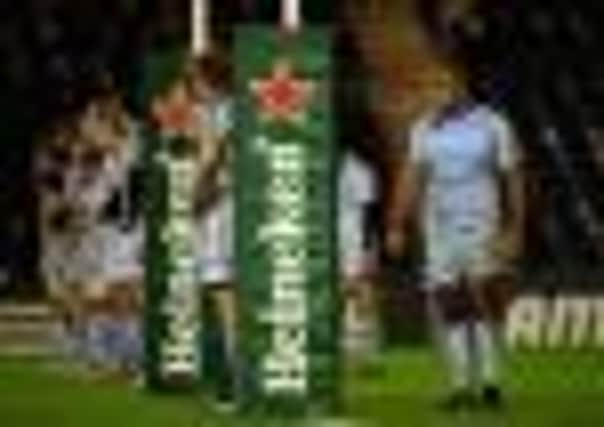Allan Massie: We need the Heineken Cup – and so we need to find a solution


First there is no relegation in that league, as there is in the English Premiership and the French Top 14. Second, qualification is assured for ten Rabo12 clubs – three from Ireland, three from Wales and two each from Scotland and Italy. In contrast England and France are automatically entitled to only six clubs each. The last two places go to the winners of the previous season’s Heineken and European Challenge Cups. If either of these has already qualified, then the slot goes to the next club from that country in their league. So Ireland had four places last season, because Leinster won the Heineken in 2011.
From our – that is the Rabo12 – point of view, the Anglo-French argument is based on a misunderstanding of the Heineken. The ERC, which runs the tournament, is an association of countries, not of leagues. This is why Italy had representatives in the Heineken long before Italian clubs were admitted to what was then the Magners or Celtic League. It is recognised that England and France are entitled to a bigger representation in the Heineken because they each have as many clubs in their top league as the sum total of Ireland, Wales, Scotland and Italy. This being so, there is theoretically always a better chance for an English or French club to win the cup than for one from the other nations. And indeed this is what happened for the first ten years of the cup. In that time Ulster in 1998-99 were the only Celtic league club to interrupt the dominance of French and English clubs – and they did so in a season when English clubs had opted out of the Heineken. The past seven years have seen a change. Munster have won the cup twice, Leinster three times, and only London Wasps and Toulouse have broken into the Irish duopoly.
Advertisement
Hide AdAdvertisement
Hide AdIt’s easy for us therefore to conclude that the Anglo-French threat to secede and set up their own competition is provoked by nothing more than sour grapes. If they were still dominating the Heineken, they wouldn’t be crying “unfair”.
This is probably true, which doesn’t however mean that they have no grounds for complaint. Some of what they say about the advantage enjoyed by their competitors, as a result of there being no possibility of being relegated from the Rabo league, is exaggerated – and not only because one can’t imagine Toulouse or Leicester Tigers being in any more danger of relegation than Leinster and Munster would be if there was relegation in their league. However the chief executive of English Premiership Rugby, Mark McCafferty (who sounds a bit Irish to me himself), takes the issue beyond the absence of relegation when he says: “Most of the Ireland squad will not be released for the Pro12 until rounds 3 or 4, something they could not do if they depended on their finishing position in the league for European qualification.”
On the face of it, this may seem reasonable – as indeed it does to many in England and France. Actually it needs to be qualified. First, neither the Irish nor Scottish clubs have control of their players as English and French ones do. The SRU and IRFU put the national team first. This is why Irish players may not be released to their clubs for early league games. So McCafferty is not comparing like with like.
Second, his complaint implies that English – and, I suppose, French – clubs always field their ideal first choice XV. But of course they don’t. Whatever the demands imposed by the need to qualify for the Heineken or to avoid relegation, they all practise rotation of players, just as the Rabo12 clubs do. The strongest – which is to say, the richest – English and French clubs can field, or almost field, two XVs of international players.
Third, Mr McCafferty’s argument is very weak when one considers the Irish position. Leinster and Munster have sufficient strength in depth to be assured, for now anyway, of finishing in the top half of their league, no matter how often the national selectors deprive them of star players. So even if qualification was imposed on the Rabo12 league, Leinster and Munster would pass the test, and Leinster might be favourites to retain the Heineken Cup. Over the past couple of years they have simply been better than any English or French club.
So far, so good. I have no doubt we have right and reason on our side. Nevertheless, sour grapes or not, the dissatisfaction of the English and French clubs is genuine; they do think the dice are loaded against them, because qualification for the Heineken is hard for them, and either easy or automatic for the Rabo12 clubs.
Equally I have little doubt that they are prepared to break away and set up an Anglo-French cup in a format that suits them. This would be very bad news for the rest of us. It is European competition and success that has stimulated the game in Ireland and is now stimulating it here in Scotland. Moreover, the television money would follow the big battalions. And there is no way in which we could stage a tournament comparable to the Heineken.
So we have to grant that the English and French clubs have a case, and consequently we must seek a compromise. Losing the Heineken would be a disaster, and ways must be found of preventing that from happening.